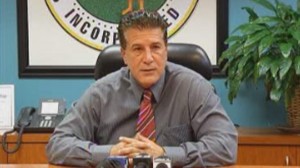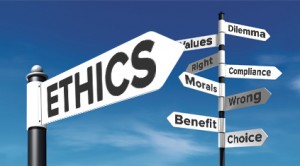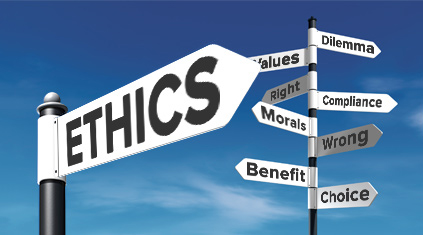 The Miami-Dade Commission on Ethics and Public Trust issued another couple of slaps on the wrists Wednesday, further convincing critics and watchdogs who wish it had more teeth that it is woefully incapable of handling the 305’s level of unethical behavior.
The Miami-Dade Commission on Ethics and Public Trust issued another couple of slaps on the wrists Wednesday, further convincing critics and watchdogs who wish it had more teeth that it is woefully incapable of handling the 305’s level of unethical behavior.
Other than the occasional negligible fines that are worked into the “cost of doing business,” the commission is mostly known for some strong words in the form of “letters of instruction” or “letters of reprimand” — what basically amounts to the finger waving admonishment of public officials who know better but, mostly, really couldn’t care less.
But still, gracias a Dios that it’s there. Can you imagine if it wasn’t? The Ethics Commission serves a much-needed role — even more so in a climate like ours — even if it sometimes it sounds like they’re just training a bunch of misbehaved puppies.
“Bad mayor! Bad lobbyist! No! Bad!”
Because, hey, somebody has to do it.
On Wednesday, the commission approved a letter of instruction to Ed Russo, who had not registered as a lobbyist for Donald Trump on the Crandon golf  course inside deal (more on that later), and a stronger letter of reprimand to Hialeah Mayor Carlos “Castro” Hernandez for having lied twice — in English and in Spanish — to the public in 2011 about income he earned from a private loan (read: he’s a loanshark like his mentor, former Mayor Julio Robaina).
course inside deal (more on that later), and a stronger letter of reprimand to Hialeah Mayor Carlos “Castro” Hernandez for having lied twice — in English and in Spanish — to the public in 2011 about income he earned from a private loan (read: he’s a loanshark like his mentor, former Mayor Julio Robaina).
Read related story: Duh! Hialeah Mayor Carlos Hernandez charged with lying re loan
The mayor’s letter of reprimand states that his conduct “showed a lack of respect for and was contemptuous of the very public he serves,” which is something that, duh, Ladra or any Hialeah firefighter could tell them. “The Mayor’s failure to tell the truth violated the public trust,” the scolding goes on. “It is his ethical legal obligation to be honest and accurate regarding his finances, which are a public matter.”
The Ethics Commission already determined that Hernandez violated the “Truth in Government” provision of the Citizens’ Bill of Rights and fined him $3,000 plus $1,000 for the cost of the investigation. He hasn’t paid yet and Ladra suspects that Hernandez, who is vocal about his disdain for the commission and their authority, will have to be taken to court.
So what’s the value? Well, for one thing, it’s certainly better to have an ethics commission that can vet these kind of complaints than have to go straight to the State Attorney’s Office. Miami-Dade SAO Kathy Fernandez-Rundle takes a complaint more seriously if it is forwarded to her by them than if you or I call her office ourselves. That’s just a fact.
Of course, some things may rise to the level of criminal prosecution and just don’t get pursued for lack of evidence (or because the evidence is just too gosh darned hard to get!). But the truth is far more elected immoral activity does not cross that line. And those violations of public trust that aren’t felonies or misdemeanors should still be recorded somewhere.
Read related story: Hialeah Mayor Carlos Hernandez is fined for loanshark lies
These letters “provide a public accounting of wrongdoing committed by persons whose holding of public office and future political prospects are dependent upon public approval,” said Ethics Commission Executive Director Joe Centorino, called “Let ‘Em Go Joe” by the critics. And perhaps a bit too harshly. He doesn’t want to let them go.
committed by persons whose holding of public office and future political prospects are dependent upon public approval,” said Ethics Commission Executive Director Joe Centorino, called “Let ‘Em Go Joe” by the critics. And perhaps a bit too harshly. He doesn’t want to let them go.
“Of course, there are times when a matter may be serious enough to warrant criminal charges, but those charges cannot be proven, so we end up with an ethics violation that may not provide appropriate penalties for the activity in question,” he admitted and, trust me, he is as frustrated by that as the rest of us.
“But before there was an ethics commission, there were virtually no legal consequences if the State Attorney elected not to file criminal charges. Unlike public employees, who can be administratively disciplined by their superiors for unethical or inappropriate behavior, there are no ‘supervisors’ for elected officials other than the public and an agency such as ours.”
Many elected officials, he added, often spend big bucks on attorneys to defend themselves of ethics complaints. Some have gone as far as protesting the wording on these letters of instruction or reprimand.
You know why? Because these things can come back and haunt you at election time. If nothing else, these letters and COE rulings provide great material for negative attack ads against incumbents who have violated the public trust. They also may have a chilling effect on smear campaigns when they come from  pols who have been deemed unethical before. Who’s ever going to believe former State Rep. Eddy Gonzalez again?
pols who have been deemed unethical before. Who’s ever going to believe former State Rep. Eddy Gonzalez again?
Read related story: Ethics Commission: Eddy Gonzalez didn’t lie; just misled
“Despite the limited scope of sanctions the commission has at its disposal, the commission has an important public function, a public shaming function,” said University of Miami law Professor Anthony Alfieri, director of the Center for Ethics and Public Service. “It enables the public to demand greater accountability from public officials and ultimately replace them in an election.”
He’s a fan of the COE.
“Joe Centorino and the commission staff have been very receptive to concerns about public official misconduct we’ve brought to their attention,” Alfieri told Ladra Thursday and immediately won her heart. He runs a civil rights and environmental justice project that has called attention to some local issues and his students found the toxin levels in the soil at Bunche Park. Someone give them a prize, please.
Alfieri suggests that that the commission would be more effective if it had more resources, to expand staff, and “more vigorous legislation or more enabling legislation, including more investigative powers and penalties.”
Hear, hear. How can we get that? Do we have to ask the very same people that they investigate? Or can we go to the state, where the COE has no jurisdiction? Hello? Are you reading this, Rep. Jose Javier Rodriguez? Ladra thought of you first to sponsor legislation that would put more teeth into municipal ethics commissions. Maybe at least let there be higher fines to serve as a deterrent.
Read related story: Ethics Commission looks into Miami Beach shakedown PAC
Of course, like most worthwhile causes, it is a double-edged sword. Because the Ethics Commission is also increasingly used by some political consultants who file flimsy complaints as part  of their campaign strategy and to thwart legitimate criticism and concern.
of their campaign strategy and to thwart legitimate criticism and concern.
Yard signs? Check. Palm cards? T-shirts? Check. Ethics complaint? Check.
“Some are abusive and they’re exploiting the complaint system for reasons that undermine the public policy purpose for the commission,” Alfieri said. “But the commission serves an important public communicative function, communicating in a symbolic way to society that these people are not credible, not legitimate and not to be trusted.”
Well, that may work in Miami Beach and Coral Gables and Pinecrest. But in Hialeah? Sweetwater? It seems that the Ethics Commission has a bigger impact in some cities than in others.
Which brings me back to Hernandez and his slap on the wrist.
It’s difficult to believe that this reprimand will hurt the man who likes to call himself The Rock, boasts about violating the Sunshine Law and steals absentee ballots from elderly voters who are afraid of losing their housing. In fact, he is helping to re-elect two Seguro Que Yes council members in November’s election (the other two drew no opposition).
Because public shaming is all fine and dandy. But sometimes what we need in the 305 is to instill a fear of something stronger… something just short of public flogging.

